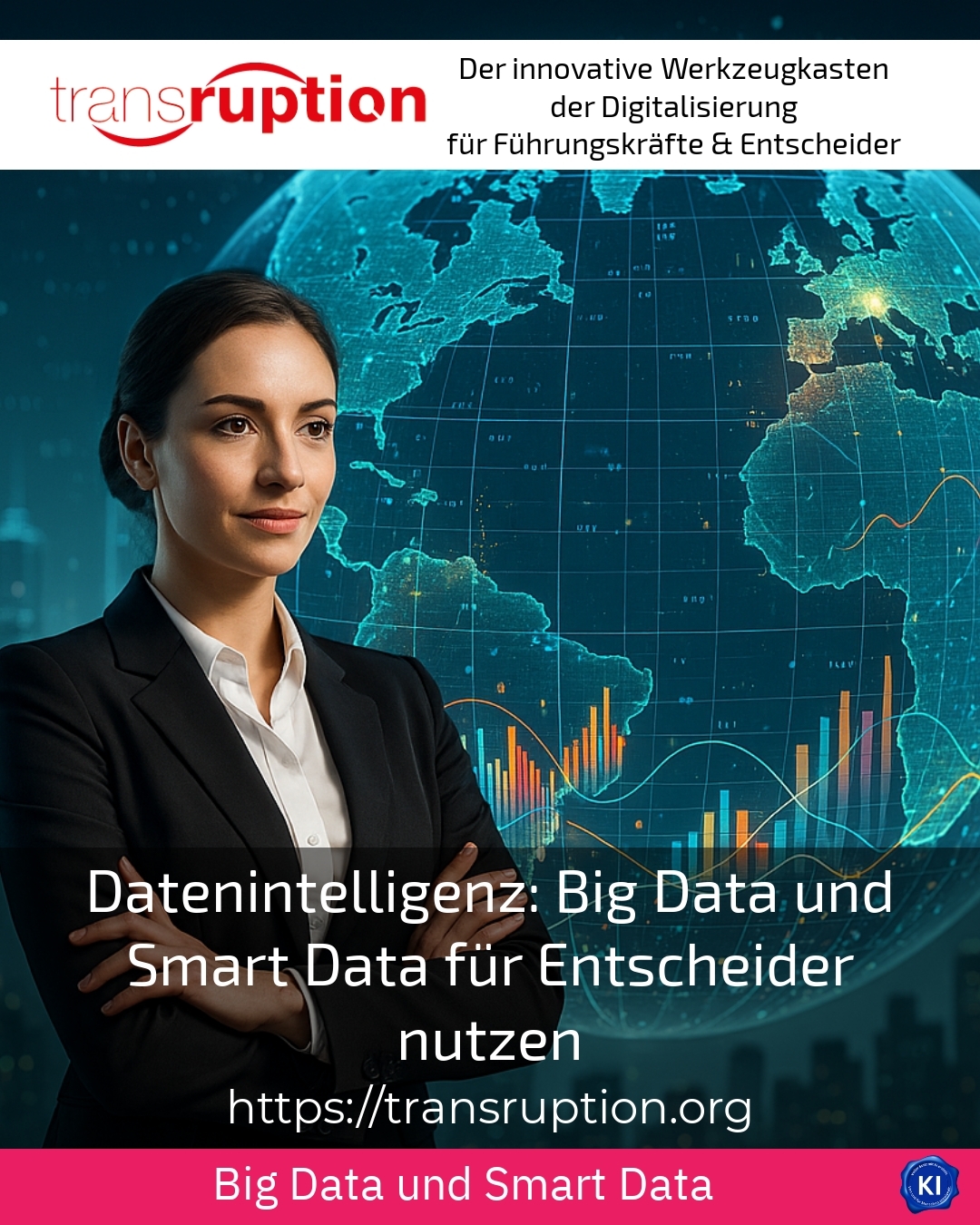In the age of digitalisation, the term Data intelligence is becoming increasingly important. Nowadays, companies are faced with a veritable sea of data, often referred to as big data. The challenge is not only to store data volumes from this wealth of information, but also to gain meaningful and usable insights from it. This is precisely where the concept of Data intelligence on: It combines big data and smart data to provide decision-makers with a supportive basis for well-founded decisions.
Data intelligence: the combination of mass and added value
Big data describes the huge amounts of diverse data that are generated in companies today. Examples include transaction data in the financial sector or sensor data from Industry 4.0.
Smart data, on the other hand, embodies the intelligent filtering and processing of these data volumes. It is about the quality, relevance and speed of the information. For example, a retail company can filter the data from millions of customer interactions that provides information about the purchasing behaviour of certain demographic groups. This results in targeted marketing campaigns with a higher chance of success.
In the automotive industry, which today produces highly networked vehicles, data intelligence is used to continuously analyse vehicle statuses. This supports predictive maintenance, for example: Smart data is used to analyse only truly relevant sensor values in order to detect failures at an early stage and optimally plan workshop appointments.
Data-intelligent working also brings benefits in the healthcare sector. Large amounts of data from patient records, laboratory results and wearables are processed in such a way that doctors can create more individualised treatment approaches. This improves the course of treatment and can reduce costs.
How decision-makers benefit from data intelligence
It is becoming increasingly important for managers not only to collect data, but also to use it in a targeted manner for decision-making. Data intelligence supports companies in this endeavour:
1. increasing efficiency through process optimisation: For example, logistics service providers analyse smart data from GPS and traffic data in order to shorten delivery times and plan routes more efficiently.
2. early risk detection: banks are using big data analyses to identify fraudulent transactions more quickly and better assess credit risks.
3. understand and retain customers: Retailers optimise their inventories and personalise offers through data-intelligent analyses of previous sales figures and customer preferences.
Another advantage of data intelligence is greater flexibility. Companies can keep a better eye on their data streams so that decisions can be adapted more quickly, even in dynamic markets.
BEST PRACTICE at the customer (name hidden due to NDA contract) An international medium-sized company in the mechanical engineering sector was able to reduce downtimes by 20 % with the help of data-intelligent analysis of machine data. Sensor information was filtered in real time and specific maintenance measures were recommended.
A structured approach for more data intelligence
The implementation of data-intelligent projects requires a systematic approach. Decision-makers should consider the following steps:
- Analyse data origin: Where does the relevant data originate? This could be the production hall, the customer platform or a CRM system.
- Clarify the target definition: What should the data be used for? Increase growth, reduce costs or recognise risk?
- Select technologies: Use of big data platforms combined with smart data analyses, machine learning or AI.
- Ensure data quality: Only reliable, complete and up-to-date data leads to reliable results.
- Communicate results: Data intelligence must be translated into understandable impulses for action.
In the energy sector, for example, huge amounts of data from different sources are brought together - weather data, consumption measurements, market prices. Here, data intelligence shows when the best time to buy energy or utilise the grid is.
In e-commerce, intelligent algorithms are used to dynamically adjust prices and discounts, which leads to increased sales.
In retail, data intelligence projects help with product range design in order to create space for high-turnover products and utilise shop space profitably.
Data intelligence as a continuous companion for projects
Many companies are faced with the challenge of realising the potential of big data. transruptions coaching can assist with the introduction of data-intelligent processes.
In the coaching process, individual requirements are identified and suitable data strategies are developed. This provides project teams with valuable impetus and helps them to overcome typical stumbling blocks.
BEST PRACTICE at the customer (name hidden due to NDA contract) A leading provider in the healthcare sector received practical support from transruptions coaching for the integration of smart data platforms. This led to noticeable improvements in patient management and data quality.
BEST PRACTICE at the customer (name hidden due to NDA contract) A logistics company was able to manage its supply chains more efficiently thanks to data-intelligent analyses. The coaching helped to rethink processes and translate big data into concrete measures.
This confirms that data intelligence means more than just technology: it supports decision-makers in a wide range of industries in sustainably developing their strategies and business models.
My analysis
Data intelligence is the key to creating real added value from the mass of available information. It combines the comprehensive possibilities of big data with the targeted quality of smart data. Managers should use this concept to make well-founded decisions, optimise operational processes and secure competitive advantages. Individual support, such as transruption coaching, is helpful in successfully implementing projects and mastering the path from the flood of data to actionable insights.
Further links from the text above:
Big Data vs. Smart Data: Is More Always Better? - Netconomy
Big data: definition, application, tips - mfr
Big data vs. smart data - Dataversity
Smart + Big Data | Artificial Intelligence
Smart data: definition, application and difference to big data
Difference Between Big Data and Smart Data - Esa Automation
For more information and if you have any questions, please contact Contact us or read more blog posts on the topic TRANSRUPTION here.















